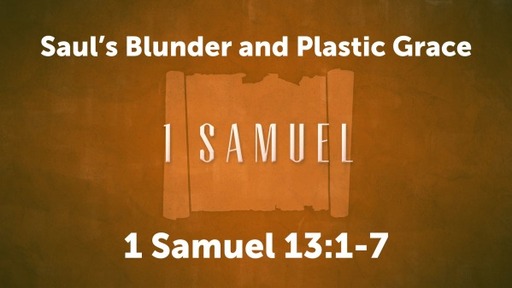Saul's Blunder and Plastic Grace

Notes
Transcript
Sermon Tone Analysis
A
D
F
J
S
Emotion
A
C
T
Language
O
C
E
A
E
Social
READ 1 Sam 13:1-7
Saul lived for one year and then became king, and when he had reigned for two years over Israel, Saul chose three thousand men of Israel. Two thousand were with Saul in Michmash and the hill country of Bethel, and a thousand were with Jonathan in Gibeah of Benjamin. The rest of the people he sent home, every man to his tent. Jonathan defeated the garrison of the Philistines that was at Geba, and the Philistines heard of it. And Saul blew the trumpet throughout all the land, saying, “Let the Hebrews hear.” And all Israel heard it said that Saul had defeated the garrison of the Philistines, and also that Israel had become a stench to the Philistines. And the people were called out to join Saul at Gilgal.
And the Philistines mustered to fight with Israel, thirty thousand chariots and six thousand horsemen and troops like the sand on the seashore in multitude. They came up and encamped in Michmash, to the east of Beth-aven. When the men of Israel saw that they were in trouble (for the people were hard pressed), the people hid themselves in caves and in holes and in rocks and in tombs and in cisterns, and some Hebrews crossed the fords of the Jordan to the land of Gad and Gilead. Saul was still at Gilgal, and all the people followed him trembling.
“Poking the Bear”
“Poking the Bear”
Saul gathers his army
Jonathan defeats the Philistines at Geba
Saul promotes it nationwide, “Saul had defeated the philistines”
The Philistines gather their forces
Fear Leads No Man
Fear Leads No Man
v. 6-7
some hid, some ran away, some stayed, trembling
Doing without God
Doing without God
v. 9-10
Fearsome army approaching, allies deserting, Saul takes matters into his own hands
He “forces himself” to offer the sacrifice when he feels he just can’t wait any longer
people strive to avoid consequences because of fear (reputation)
we miss the transformation God would have worked through affliction
instead, we insert Plastic Grace
Plastic Grace-
Plastic Grace-
Plastic Grace is intended to look like the real thing, but it lacks the power of God.
Plastic grace seeks to cover up the consequences of sin for the sake of “security”, reputation, etc. and then put a “God” sticker on it.
Sexual sins are covered up in unwise hurried marital unions, abortions, institutional coverups. (e.g. pastor’s admission, victims correction. SBC)
Families with no spiritual communion take solace in their once-a-week trip to Sunday service.
Men and women whom God wants to move, come short of obedience to His prompting, and dismiss conviction as mere emotionalism. Then comfort ourselves that God loves us “just the way we are”.
PLASTIC GRACE is man centered
it makes me feel good, precious, exonorated
it requres the participation and approval of my horizontal audience while failing to acknowledge my vertical audience
it insulates and innoculates the soul against any truly transformative conviction (Godly sorrow that works repentance; 2 Cor 7:10)
it insulates the soul from dealing with the holiness of God
it sets the soul in danger of repeating the offense, gives birth to compromise, trains us in spiritual fantasy and disciples the next generation in spiritual naievity and generational spiritual decay.
We are to quit treating sin like a cuddly kitten who happens to have occassionally sharp claws, and start treating it like the insidious spiritual cancer that will one day, short of TRUE GRACE send your soul to hell.
God’s answer:
Hebrews 12:5–11 (ESV)
And have you forgotten the exhortation that addresses you as sons?
“My son, do not regard lightly the discipline of the Lord,
nor be weary when reproved by him.
For the Lord disciplines the one he loves,
and chastises every son whom he receives.”
It is for discipline that you have to endure. God is treating you as sons. For what son is there whom his father does not discipline? If you are left without discipline, in which all have participated, then you are illegitimate children and not sons. Besides this, we have had earthly fathers who disciplined us and we respected them. Shall we not much more be subject to the Father of spirits and live? For they disciplined us for a short time as it seemed best to them, but he disciplines us for our good, that we may share his holiness. For the moment all discipline seems painful rather than pleasant, but later it yields the peaceful fruit of righteousness to those who have been trained by it.
